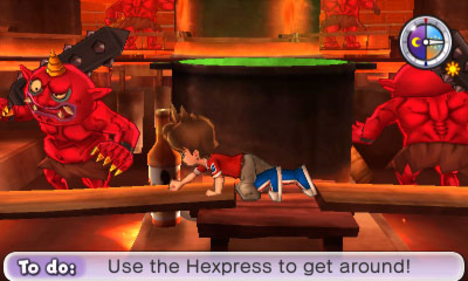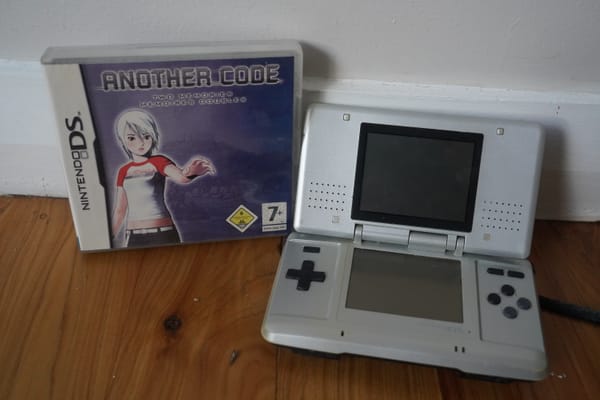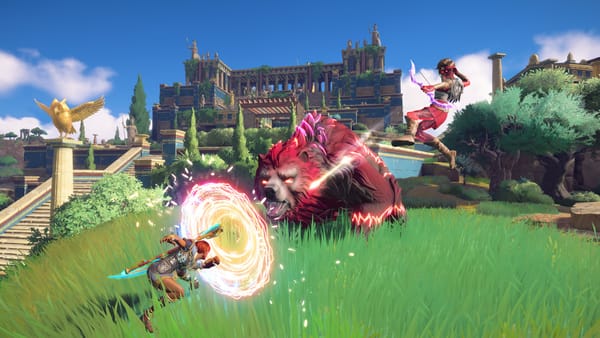External Review: Yo-Kai Watch 2

Review originally for and posted on Digitallydownloaded.net.
Yo-Kai Watch is a modern monster collecting and battling JRPG series that lives in the shadow of Pokémon. But with western releases of other media in the series such as the anime, this immediate response to the game is becoming less common and people are starting to see the series stand out on its own. The latest release in the Yo-Kai Watch series, Yo-Kai Watch 2: Psychic Spectres, is really just a "ultimate" version of the original two Yo-Kai Watch 2 titles, and such it's something that fans have already played, but it's still a great game in its own right.
There has been plenty of praise for the original versions of Yo-Kai Watch 2 (Fleshy Souls and Bony Spirits), and the original game as well, and the common thread in commentary around this series is that it has a strong slice of life side to it - it takes place in locations that are mundane and plays out like a bunch of kids running around a neighbourhood having a great time with their imaginations. Despite the world infested with yokai (Japanese spirit-animals or monsters) each game's world feels more believable and authentic as a result.
The nostalgia for the adventures of youth living in suburban Japan that Yo-Kai Watch 2 is further enhanced when the game introduces a version of the Kemamoto region in the past, and giving players the ability to time travel. Here we have an extra nostalgia for a past Japan. One that reflects a simpler time when there was a lack of development within the vibrant country. Steam trains replace the public transport of the future, and next to the established city of the present the world becomes a bygone era that offers a very different feeling of exploration. The world seems more simplistic and despite the ability to roam the world on your own in the present, the world is also arguably freer. It's a feeling that many, many Japanese feel strongly, making this game all the more cultural artefact when compared to the Pokemon series, and its more global aesthetic.
The inclusion of time travel in games is usually something which feels contrived, but in Yo-Kai Watch 2 it gets away with it by not fixating on the inherent paradoxes to time travel, and simply lets the nostalgia wash over players. That's not to say there isn't a narrative purpose to the time travel. The original Yo-Kai Watch is created by the protagonist's grandfather, who begrudgingly befriends you when you go back in time to visit him. His world is filled with more flair due to his comic book hero persona he 'has adopted, which makes the hero of the story feel like a sidekick, despite basically doing all the work.
Along the way, the really interesting facet to the Yo-Kai Watch storytelling starts to kick in - this game is fundamentally educational, and the various characters and situations that your protagonist gets wound up in tend to have some kind of Aesop's Fables-like moral to their stories. One such event I enjoy is the simple act of crossing a red light. Do it too many times in in Yo-Kai Watch and an oni - an overwhelmingly powerful monster, will appear to chase you down and teach you a lesson.
A lot of the story in all three Yo-Kai Watch 2 games is a retread of what happened in the original release, but it uses narrative tricks to get away with that too. The story starts off with a mysterious Yo-Kai erasing all memories of all the characters from the previous game so everyone can start fresh. The player then is tasked to seek out the yokai Jibanyan (who was their best buddy from the first game), and once they track him down they get a new introduction to the yokai, for the benefit of new players to the series. It's quite clever, really; it won't aggravate people who did play the original, but at the same time it gets new players up to speed with the series quickly.
Meanwhile, aside from the yokai themselves, a charming interaction happens during the opening of the game with the player’s family arguing over doughnuts. In the original versions of Yo-Kai Watch 2 the chosen flavour was fixed, but in this one the option to actually pick the "best" doughnuts during this scene creates an interesting tension and story mechanic to guide the game towards certain events based on the player's choice. The mission quests included in the game are no longer limited by the title version, with Psychic Spectres offering players the ability to play quests from both Bony Spirits and Fleshy Souls, which results in a far larger and more nuanced package.
Yo-Kai Watch 2: Psychic Spectres is the definite version of Yo-Kai Watch 2 in other ways, too. Players will still find new things to do within the third title, such as the ability to transfer their save to access new dungeons and bosses. It's possible to recruit a bunch of monsters that were previously exclusively enemies. There is also new post-game content for all players in the form of new locations, most notably Gera Gera Resort, which is basically a demonic theme park.
The biggest disappointment of Yo-Kai Watch 2 comes from a simple mechanic designed to make people play all the games, that of course is exclusive yokai. Now the idea isn't at all evil - Pokemon has been doing it for generations - except that here the very best yokai is trapped behind this system. The way it works is if you take photos with your yokai you can then trade them within games. Now, one of the most popular yokai, if not the most popular, is Komasan, a dog monster that won the anime series over effortlessly. This awkward yokai from the country has a catch phrase ("oh my swirls") that is just delightful, and it is criminal that you can't actually capture the fellow through normal play. You have to trade for him. For people who don't have anyone to trade with, he still pops up in a side quest, but while it might sound like a minor thing, the cynicism from Level-5 in locking what they know is a really popular character behind a wall that forces a family to buy two copies of the game is a downer on an otherwise sweet story.
That aside, Yo-Kai Watch continues to be a delightful mix of morality stories for children, nostalgia for what it's like to be a child in suburban Japan, humour and monster collecting. The series may well never hit the same notes of mainstream popularity as Pokemon, but the fact that Pokemon has got a very genuine competitor in this particular genre, finally, is hopefully a sign that will push both franchises forward into the future.





